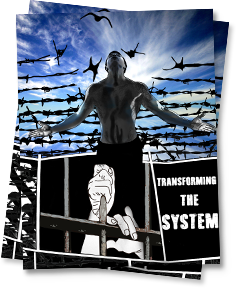Eliminating the criminalization of poverty
The Supreme Court has held that no person should be jailed for nonpayment of fines they simply cannot afford. The Constitution requires that people who are charged with nonpayment of fines and fees be provided a hearing on their ability to pay prior to being punished with jail time. It also requires that people are afforded counsel when sentenced to jail or a suspended jail sentence. States, and local government should take steps to comply with this mandate.
To address these issues, the Department of Justice (DOJ) should:
- Provide technical support and resources for courts and support for courts to promote compliance with constitutional standards;
- Investigate and bring enforcement actions against debtors’ prisons that touch on areas in which DOJ has authority, e.g. juveniles;
- “[I]ssue guidance to state and local governments on the constitutionality and cost-effectiveness of anti-homeless ordinances [including panhandling ordinances], intervene in litigation challenging such ordinances, incorporate investigation of civil rights abuses of homeless people as a standard practice in federal pattern and practice investigations, and include provisions addressing discriminatory policing of homeless people in federal consent decrees.”
- Issue best practices and necessary safeguards to determine indigence and “significantly reduce the risk of an erroneous deprivation of liberty,” including those dictated by the Court in Turner v. Rogers as a minimum:
- (1) notice to the defendant that his “ability to pay” is a critical issue in the contempt proceeding;
- (2) the use of a form (or the equivalent) to elicit relevant financial information;
- (3) an opportunity at the hearing for the defendant to respond to statements and questions about his financial status, (e.g., those triggered by his responses on the form); and
- (4) an express finding by the court that the defendant has the ability to pay.
Local and state governments should do the following:
- Repeal legislation authorizing the imposition of user fees, including public defender fees;
- Repeal legislation imposing mandatory “assessments” on criminal defendants, traffic offenders, and people sentenced for civil offenses;
- Review municipal and state court procedures and rules to ensure that fine and fee collection comports with constitutional protections for due process and equal protection of the law, so that people are not jailed for non-payment of civil fines, fees, and/or penalties they cannot afford to pay without prior procedural protections;
- Ensure that counsel is appointed at the sentencing and post-sentencing enforcement stage whenever a person faces incarceration for nonpayment of a fine or fee;
- Eliminate incarceration and jailing for civil penalties and fines;
- Establish a state and local taskforce to identify court practices that incarcerate indigent defendants for poverty and make recommendations to address these practices in municipal courts;
- Eliminate public defender fees;
- Eliminate payment plan fees, late fees, collection fees, and interest that creates mounting debt for low-income individuals;
- Eliminate bars on the right to vote, access housing, or access driver’s licenses based on the payment of criminal justice debt;
- Require that judges with a pattern of unconstitutionally punishing defendants for non-payment of civil fines and/or criminal justice debt are disciplined by ethics committees;
- Eliminate fees for participation in community service and other alternatives to incarceration and fines/fees;
- Make alternatives to incarceration and to fines and fees available at sentencing, and ensure that they accommodate the needs of people with limited access to public transportation, child care needs, disabilities, and other limitations;
- “Prohibit ‘auto-jail’ policies, repeated jail sanctions, and frequent court appearances” associated with criminal justice debt.
- Permanently eliminate the use of asset forfeiture unless the government can prove that the property in question was connected with a crime by clear and convincing evidence.
- Permanently eliminate programs that incentivize civil asset forfeiture, including federal-local/state sharing schemes.
- Require due process judicial hearings prior to the enforcement of civil penalties related to criminal activities, including nuisance abatement of property and civil confinement; and routine follow up proceedings to ensure continued compliance with due process requirements;
Courts should comply with the guidance provide by the DOJ concerning the treatment of fines and fees, which are provided below:
- “(1) Courts must not incarcerate a person for nonpayment of fines or fees without first conducting an indigency determination and establishing that the failure to pay was willful;
- (2) Courts must consider alternatives to incarceration for indigent defendants unable to pay fines and fees;
- (3) Courts must not condition access to a judicial hearing on the prepayment of fines or fees;
- (4) Courts must provide meaningful notice and, in appropriate cases, counsel, when enforcing fines and fees;
- (5) Courts must not use arrest warrants or license suspensions as a means of coercing the payment of court debt when individuals have not been afforded constitutionally adequate procedural protections;
- (6) Courts must not employ bail or bond practices that cause indigent defendants to remain incarcerated solely because they cannot afford to pay for their release; and
- (7) Courts must safeguard against unconstitutional practices by court staff and private contractors.”
The National Taskforce for Fees and Fines, which was formed by the Conference of Chief Justices, the association of the top judicial leaders, and the Conference of State Court Administrators, the organization of court executives that oversees judicial administration in the state courts, should develop a protocol for disciplining judges who routinely violate constitutional requirements through practices that have the effect of incarcerating low-income individuals for their inability to pay fines or fees.




